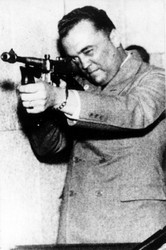Edgar Hoover FBI
|
| updated |
Copy Link Code
|
 J. Edgar Hoover, director of the Bureau of Investigation from 1921-24, was very focused on modernizing the bureau's agents and procedures. Under his leadership, the bureau used the most recent advances in technology for investigations, as well as improving techniques and training. As a result of his improvements, he was able to obtain more funding from Congress, helping to overhaul outdated methods and provide the newest tools and advanced training available.
J. Edgar Hoover, director of the Bureau of Investigation from 1921-24, was very focused on modernizing the bureau's agents and procedures. Under his leadership, the bureau used the most recent advances in technology for investigations, as well as improving techniques and training. As a result of his improvements, he was able to obtain more funding from Congress, helping to overhaul outdated methods and provide the newest tools and advanced training available.
Prior to the establishment of the new bureau, began exhibiting behaviors that would continue until his death. In 1919, he made the crucial decision to target Pan-African leader and activist Marcus Garvey, who he designated a "notorious negro agitator". In order to get rid of this perceived threat, Hoover tried to come up with any evidence to convict Garvey of a crime. To assist him in this endeavor, Hoover hired the bureau's first black agent, James Wormley Jones, who was sent under cover to gather information about Garvey and sabotage them. This covert, illegal operation led to the bankruptcy of Garvey's shipping line – Black Star Line – which he had established to transport goods from Africa and the Caribbean to those in the black community in the U.S.
Then, in 1935, the bureau was renamed and the Federal Bureau of Investigation was established. As the first director, J. Edgar Hoover attempted to establish the FBI as a forerunner of investigative techniques, integrity, and professionalism. Unfortunately, his plan for accomplishing such a lofty goal was filled with several ups and downs. In the 1930s, Hoover headed several investigations and raids attempting to curtail the rampant development of "Mafia gangsters", which had sprung up during Prohibition. Although his anti-gangster campaign led to the establishment of the FBI, he was simultaneously claiming the Mafia didn't exist. He became a national 'hero' for defeating notorious gangsters such as John Dillinger, but these exploits came at a significant cost, including the loss of FBI agents and innocent bystanders.
J. Edgar Hoover and the FBI spent the 1940s and 50s conducting a great deal of illegal, covert surveillance on those he labeled to be Communist or radical. In 1956, he created COINTELPRO (the Counter Intelligence Program) in an attempt to discredit and disband numerous organizations such as the Black Panthers, the Ku Klux Klan, and the Socialist Workers Party. He also spent several years following a particularly obsessive vendetta against civil rights leader Martin Luther King, Jr. For reasons of his own, Hoover designated the esteemed leader "the most dangerous Negro in the future of this nation" and conducted 24-hour surveillance on him, including illegal wiretaps.
In 1971, COINTELPRO activities were finally exposed and revealed to the public, including some shocking and illegal behavior such as planted evidence, false rumors, infiltration, and burglaries. Following Hoover's death in 1972, it was discovered that he had collected information on every president from Coolidge to Nixon, which might help explain why he was never removed from his position, despite Truman, Kennedy, and Johnson's desire to do so. In fact, at his death, Hoover's name was given to the FBI building in Washington, D.C. but the removal of his controversial name from the agency's building has been suggested many times.
